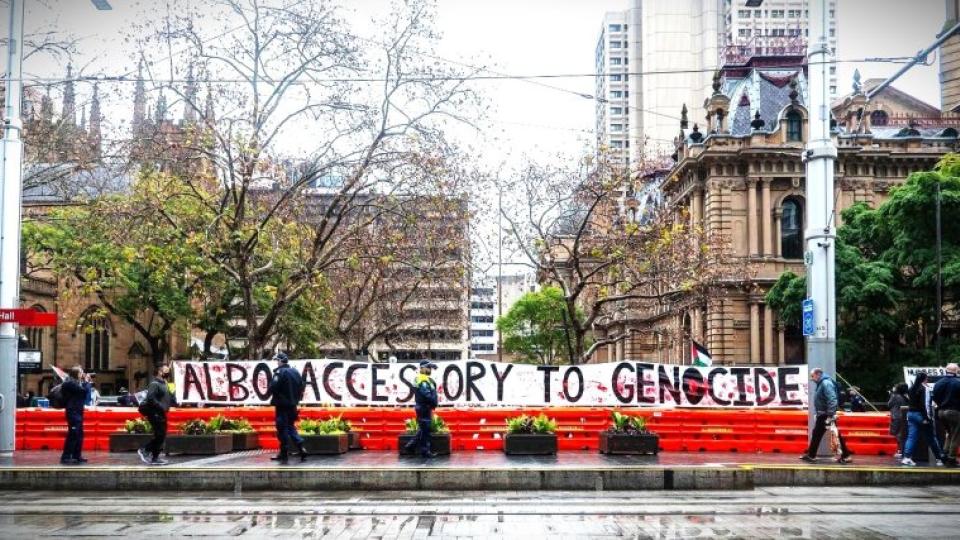Palestine solidarity movement exposes Western hypocrisy on protest rights

One of the remarkable achievements of the movement against genocide in Palestine is its sustained mass mobilisations, across Australia, for nearly 10 months.
The anti-war movement is confronting Labor’s intransigent support for Israel.
This is because supporting Israel is a foundational policy for the United States and its imperialist allies, including Australia.
Israel’s existence is central to imperialism maintaining its interests in the Middle East.
For this movement — with little institutional support from unions and faith-based groups — to force Labor to change its policy was always going to be a tall order.
However, the very existence of the global Palestine solidarity movement represents a challenge to Western capitalism’s normalisation of Israel’s genocide and untold horrors against Palestinians.
Sustained protest is one of the only means working people have to challenge government complicity in Israel’s genocide.
This is why the movement for justice in Palestine is coming under sustained attack.
Labor and the compliant corporate media’s attempts to smear the movement as being “antisemitic” are being used to confuse and silence critics.
Prime Minister Anthony Albanese claims that Palestine solidarity protesters are encouraging violence and anti-democratic behaviour against MPs, yet downplays Islamophobic attacks.
Labor is well aware of the high level of public support for a sustained ceasefire in Palestine.
This is why it is making rhetorical statements calling for an immediate ceasefire, yet it refuses to sanction Israel or end its arms exports.
Labor is increasingly worried about support for Palestine losing it marginal seats at the next election.
Its appointment of Jillian Segal, a Zionist, as an “envoy” to supposedly address antisemitism, is part of its push to isolate the Palestine solidarity movement.
This has laid the ground for prominent Palestinian activists, such as Hash Tayeh, to be targeted for allegedly inciting hatred.
The longer the Palestine protest movement continues the more effort state governments and other institutions, such as universities, are putting into repressing and intimidating protesters.
Victorian Police began to restrict protest organisers’ use of a public access truck that had not been a problem since October. The police are now using pepper spray and force against pro-Palestine protesters. No explanation has been provided for the change in policing.
University students are facing the threat of expulsion by management for their role in the Gaza solidarity encampments. The University of Sydney is attempting to place severe restrictions on campus activism.
Workers at the State Library of Victoria have even been warned against wearing Palestinian pins or badges.
A renewed push to get universities to adopt the International Holocaust Remembrance Alliance’s problematic definition of antisemitism is also underway.
Labor purports to support freedom of speech and the right to assembly, but its crack down on people who dissent is becoming a pattern.
Climate protesters are being targeted, the most recent example being a Blockade Australia activist who was sentenced to three months in jail by New South Wales’ draconian anti-protest laws.
Labor in opposition supported the NSW Coalition’s anti-protest laws, parts of which the Supreme Court ruled were unconstitutional.
The Human Rights Law Centre recently said that Australia had introduced more than 49 anti-protest laws over the past 20 years.
When capitalist governments’ legitimacy is challenged by sustained grassroots movements — whether opposing genocide or acting on the climate emergency — their go-to action is to clamp down on our right to protest.
The lesson is that our democratic rights under liberal capitalist democracies cannot be taken for granted.
We need to continue to organise in the streets, workplaces, campuses and elsewhere to preserve our rights and demand that all anti-protest laws be repealed.
[Jacob Andrewartha is a national co-convenor of Socialist Alliance.]